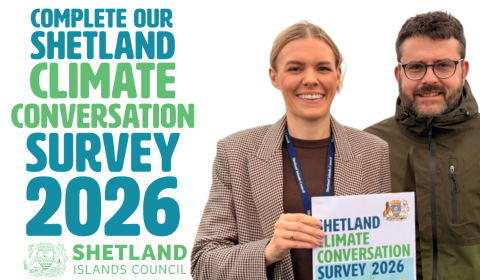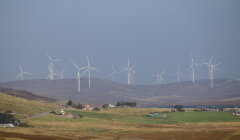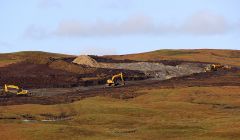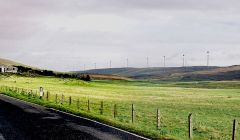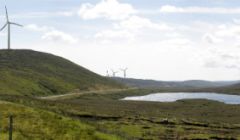Letters / Rushing into industrialisation misguided
Adrian Brockless responds to Rhoda Grant MSP
I would like to express my gratitude to Rhoda Grant MSP for her response (Communities need to own their own wind farms, Shetland News, 26 August 2024) to my letter published in Shetland News on 5 August.
Ms. Grant has reiterated her claim that she was unfairly represented in an interview with the Shetland Times. While I cannot comment on this, as I am not involved with the Shetland Times, I do note that she has yet to specify how she was misrepresented, despite raising the issue twice.
My reference to the Shetland Times interview in my letter on 5th August centred on two specific claims: that Ms. Grant described the wind turbines as “pretty” and that she suggested they are a temporary feature, removable once climate change is addressed. Ms. Grant has reiterated both these claims in her reply, so I trust she does not believe I have also misrepresented her in my letter to Shetland News on 5 August.[i]
In that letter, I used her remarks to highlight the responsibility of our elected representatives to thoroughly inform themselves and to communicate in a manner that does not invite misleading inferences.
There is no dispute regarding Ms. Grant’s personal opinion that the wind turbines are aesthetically pleasing. My initial point was that her remarks are logically equivalent to those who consider the turbines unsightly. Since the Labour Party has stated it will not consider objections to wind farm developments on the grounds of aesthetics, it follows that any supportive comments based on their visual appeal should similarly be discounted.
Ms. Grant’s response, however, warrants further examination. She claims to agree with my views on siting wind farms on peatland, yet she proceeds to make a series of points that are either at odds with, or unrelated to, the content of my letter. I do not say this to be provocative, but it is concerning when a public servant either has not read the letter to which they are responding or has failed to grasp its contents.
Become a member of Shetland News
Much of Ms. Grant’s response addresses points I did not raise—specifically, those concerning employment, hydrogen production, and so forth. Therefore, I will largely, though not exclusively, confine my reply to the points I made about the industrialisation of peatland.Ms. Grant is correct when she asserts that we need to assess the benefits and drawbacks scientifically and objectively, ensuring we “do not do more harm than good in our attempts to reach net zero.” I will endeavour to do this in my reply, a task Ms. Grant did not undertake, while also suggesting that the “robust” planning system to which she refers may not be as effective as she believes.
Given that the Energy Consent Unit (ECU) has approved the industrialisation of pristine peatland in North Yell by Energy Isles/Statkraft, it is, at the very least, reasonable to question the system’s efficacy.
Ms. Grant expresses significant concern about human-induced climate change and implies that constructing more wind farms in Shetland will help mitigate it.
The UK currently accounts for about 1.1 per cent of global greenhouse gas emissions (GHGs), a figure that is declining. The Scottish Government announced last January that renewable technologies generated the equivalent of 113% of Scotland’s total electricity consumption in 2022.[ii] This places the UK 17th among global emitters, with China leading at 28%.[iii] Indeed, global emissions are still rising, primarily driven by China, India, and the United States.[iv]
Given the UK’s 1.1 per cent contribution, Scotland’s share is even smaller, with Shetland’s contribution smaller still. Without considering other factors, this means that the impact of additional wind farms in Shetland on global climate change would be negligible.
Considering factors such as the industrialisation of peatland, there is a strong case to be made that further large-scale wind farms in Shetland may do more harm than good—something Ms. Grant rightly opposes. It is to the peatland issue that I now turn.
Blanket bogs cover only three per cent of the Earth’s landmass, with the UK holding nearly 15 per cent of that, some of which is in good condition (sequestering GHGs) and some degraded (emitting GHGs).[v] [vi] These bogs store more carbon than all the world’s forests, making them the most effective land-based carbon sink. Conserving and restoring them is more effective than planting trees.[vii]
Thus, the priority should be on conserving existing peat bogs and restoring degraded ones to ensure long-term carbon sequestration and combat the climate crisis. For good reason, it is rarely suggested that rainforests should be cut down for renewable energy developments.
The value of peatland has recently been recognised by UNESCO, with Jillian Martin, Scotland’s Net Zero Secretary, stating, “the Flow Country is… a vital part of our efforts to combat climate change and nature loss.” Professor Mike Robinson, Non-Executive Director of Culture at the UK National Commission for UNESCO, said, “World Heritage status recognises the global importance of the Flow Country and its peat bogs, not only as an important ecosystem for wildlife but also, through their carbon storage, as a critical defence against the impact of climate change.”
UK Government Culture Minister Sir Chris Bryant also highlighted the Flow Country as “one of our most precious resources.” This recognition, however, does not seem to extend to the rare oceanic peatland in Shetland, despite its ecological value and potential for carbon sequestration.[viii]
The argument that industrialising peat bogs can be offset by restoring degraded peatland elsewhere is fundamentally flawed. Firstly, peatland in pristine or near-natural condition should never be sacrificed for the promise of restoration elsewhere, yet this is happening in Shetland.
Secondly, while turbines will last 40 years or less, functioning peat bogs in Shetland have sequestered carbon for over 5,000 years. Degraded peatland needs urgent restoration, not development, so that it can absorb rather than emit GHGs, becoming part of a long-term solution. Developing peatland trades millennia of GHG mitigation for minimal, if any, climate change benefits.
With this in mind, the impact of more wind farms in Shetland is likely to be less beneficial than the preservation and restoration of peatland, a long-term carbon sink. This underscores the importance of public servants like Ms. Grant understanding renewable energy within its environmental context, even if they are not directly involved in planning consent decisions.
In terms of planning, the Scottish Government’s National Planning Framework Version 4places significant emphasis on the value of peatland. This seems to have been overlooked in the consents granted to both recent and upcoming developments, particularly given the emphasis in policy 11e on demonstrably reducing greenhouse gases.
Although not mentioned in my letter, Ms. Grant notes that so-called “green” hydrogen is “dependent on resources such as wind energy.” Understanding environmental context is crucial here.
In April 2022, the British Government commissioned research into the atmospheric implications of increased hydrogen use. The research was conducted by the University of Cambridge and the National Centre for Atmospheric Sciences with the University of Reading research and found that leakage of hydrogen into the atmosphere “will…increase the atmospheric lifetime of methane and its impact on climate.” Accordingly, it will “affect atmospheric composition (with implications for air quality) and have an indirect warming effect on climate, partially offsetting some of the climate benefits of the reduction in carbon dioxide.”[ix]
Ms. Grant asserts that every effort must be made to reach net zero and cut GHG emissions. If she is serious, she must consider the science and arguments presented here.
Ms. Grant also highlights the alarming pace of climate change and its disproportionate impact on less developed countries. Similarly, there are no geographical limits to offsetting. Instead of industrialising one area of peatland on the promise of restoring another, why not build wind farms away from peatland altogether, while still committing to peatland restoration?
This would seem a far better climate solution, with potentially positive environmental impacts if wind farms are carefully sited. There are similar schemes for rainforests, such as the Bonn Challenge, so why not for peatland, given its carbon sequestration potential?[x]
Claiming that wind farms should be built on peatland simply because those areas are windy is no justification. As absurd as it may sound, this reasoning was recently offered to me by a representative of an energy company involved in bringing more wind farms to Shetland.
However, Ms. Grant does make a radical suggestion with which I would cautiously agree. She proposes that local communities should own and develop their own wind farms. The specifics of what she means by “owning” are unclear, but if she envisions small groups of turbines (no more than five per group, with a tip height of no more than 55 metres, appropriately sited across Shetland to provide power for all, then I would agree.
Such an approach could effectively decarbonise Shetland, significantly reduce energy bills, and alleviate fuel poverty. As it stands, we are expected to buy back the power we supply to the national grid at inflated prices, despite the environmental costs outlined above.
Being at the forefront of energy generation and innovation is not inherently beneficial. History should have taught us that. Both energy generation and innovation must be approached with caution and careful consideration. Rushing into industrialisation under the illusion that it will have a measurable impact on climate change is misguided.
Although Ms. Grant’s response addressed little of the content of my letter of 5 August, I hope she does not mind my focus on ecological and environmental considerations, as these, we are told, are the reasons for the industrialisation of Shetland with windfarms in the first place.
Adrian Brockless
Burravoe
Yell
[i] https://www.shetnews.co.uk/2024/08/05/sacrificing-shetlands-precious-peatlands-poor/
[ii] https://www.gov.scot/news/record-renewable-energy-output/
[iii] https://edition.cnn.com/interactive/2023/12/us/countries-climate-change-emissions-cop28/
[iv] https://climate-change.data.gov.uk/articles/measuring-greenhouse-gas-emissions
[v] https://www.iucn-uk-peatlandprogramme.org/sites/default/files/Review Peatland Biodiversity%2C June 2011 Final_1.pdf [vi]https://www.ramsar.org/sites/default/files/documents/library/rtr11_peatland_rewetting_restoration_e.pdf
[vii] https://www.unep.org/news-and-stories/story/peatlands-store-twice-much-carbon-all-worlds-forests
[viii] https://www.gov.uk/government/news/scotland-to-have-worlds-first-peatland-unesco-world-heritage-site
[ix] https://assets.publishing.service.gov.uk/media/624eca7fe90e0729f4400b99/atmospheric-implications-of-increased-hydrogen-use.pdf
[x] https://www.bonnchallenge.org/
Sacrificing Shetland’s precious peatlands for poor temporary climate solutions

























